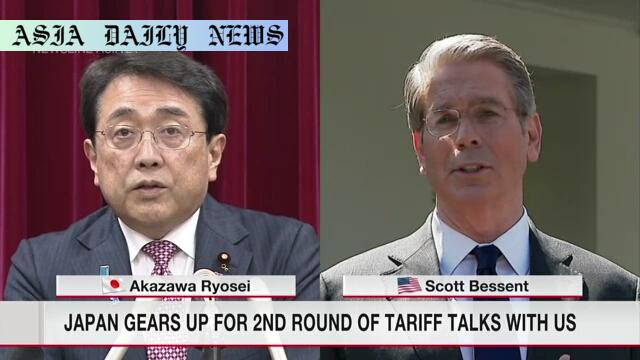Tariff Talks – Japan seeks mutual benefits in second round of discussions with the US, addressing key industries like auto and steel.

Addressing Key Tariff Concerns
Japan is intensifying preparations for the second round of tariff negotiations with the United States, demonstrating an ongoing commitment to fostering mutual economic benefits. The talks, scheduled for next week, will focus on addressing key US complaints concerning auto exports and other tariff-related challenges. Prime Minister Ishiba Shigeru has instructed Cabinet members to accelerate efforts to prepare for these critical discussions, emphasizing the potential impact of US tariffs on both the Japanese and global economies.
The spotlight is on Japan’s auto and steel industries, which are major contributors to economic expansion and trade. The talks come at a crucial time when Japan’s automakers, including Nissan, Honda, and Toyota, have showcased their commitment to the American economy by continuing substantial investments in US production facilities. Such moves are designed to assuage US concerns while spotlighting Japan’s significant role in job creation and investment.
Fostering Positive Trade Collaborations
The Japanese government remains resolute in leveraging its industries’ ongoing contributions to the US economy as a negotiating tool. For example, Toyota recently announced an $88 million investment to bolster production across its US facilities. Similarly, Honda and Nissan are actively working to shift parts of their manufacturing processes to the United States, aligning with the current administration’s priorities to bolster domestic economic growth.
The ultimate negotiation agenda is built on achieving mutually beneficial results. By addressing tariff measures that could potentially destabilize the free and fair trade order, Japan seeks to create a framework for better transparency and collaboration. The government is also compiling a comprehensive report detailing the prospective investments by Japanese companies in the US, substantiating the collaborative spirit that exists between the two economies.
Impact on Global Economics
Prime Minister Ishiba has voiced concerns that the imposition of certain US tariffs poses risks not only to Japanese industries but also to the broader global economy. This perspective underlines the significance of these talks, as policymakers in Tokyo and Washington aim to de-escalate potential disruptions caused by tariffs, especially in pivotal industries such as automotive and steel production.
Japan is advocating for more clarity on how its investments and exports positively influence American infrastructure, communities, and labor forces. Encouraging evidence—such as the economic benefits tied to Japanese manufacturing expansions—is being prepared to strengthen Japan’s position during these tariff talks. The discussions, therefore, have broader implications, establishing a precedent for bilateral negotiations concerning global trade relations in an era of increasing economic uncertainty.
The Road Ahead
As Akazawa Ryosei, Japan’s top negotiator, heads to Washington for the crucial three-day visit, the government remains focused on presenting a robust case for eliminating restrictive tariffs. With constructive engagement from both nations, the second round of tariff talks could pave the way for progress, ensuring that collaboration continues to thrive between these two major economies.
The outcome of these talks will be critical for industries and policymakers alike. Observers worldwide will closely watch the developments, recognizing their significance for global trade stability and economic health. Ultimately, the willingness of Japan and the US to embrace mutual benefits will determine the long-term trajectory of their economic partnership.
Commentary
A Crucial Moment for Bilateral Trade
The upcoming second round of tariff talks between Japan and the United States is undoubtedly a pivotal moment not only for these two countries but also for the stability of global trade. The strategic importance of addressing tariff barriers before they lead to economic disruptions cannot be understated. Prime Minister Ishiba’s proactive approach demonstrates that Japan is deeply invested in maintaining and enhancing its economic ties with the US while safeguarding the interests of its critical industries.
Industry Collaborations Lead the Way
One of Japan’s strongest arguments lies in its longstanding commitment to investing in the US economy. Automotive giants like Toyota, Honda, and Nissan continue to expand their operations in the United States. Such moves highlight the mutual dependency and shared prosperity that have characterized Japanese-American trade relations for years. By showcasing these contributions, Japan hopes to build a compelling case against the tariffs, which threaten to undermine the very foundation of free trade.
Balancing Act Between Policy and Economy
The concerns raised by Japan regarding the potential global economic impact of US tariff policies are particularly noteworthy. At a time when global economies are interconnected, protectionist policies in one region can create ripple effects elsewhere. Japan’s approach to demonstrating how collaborative efforts bolster economies is a model other nations might adopt when facing similar challenges.
Conclusion: A Test of Diplomacy
The second round of tariff talks serves as an acid test for diplomacy in the face of economic challenges. The outcome of these discussions will likely have ramifications that stretch beyond bilateral relations, influencing how nations approach trade policies in the future. As these talks unfold, they provide a unique opportunity to reaffirm the value of shared economic investment and the vitality of international collaboration.


